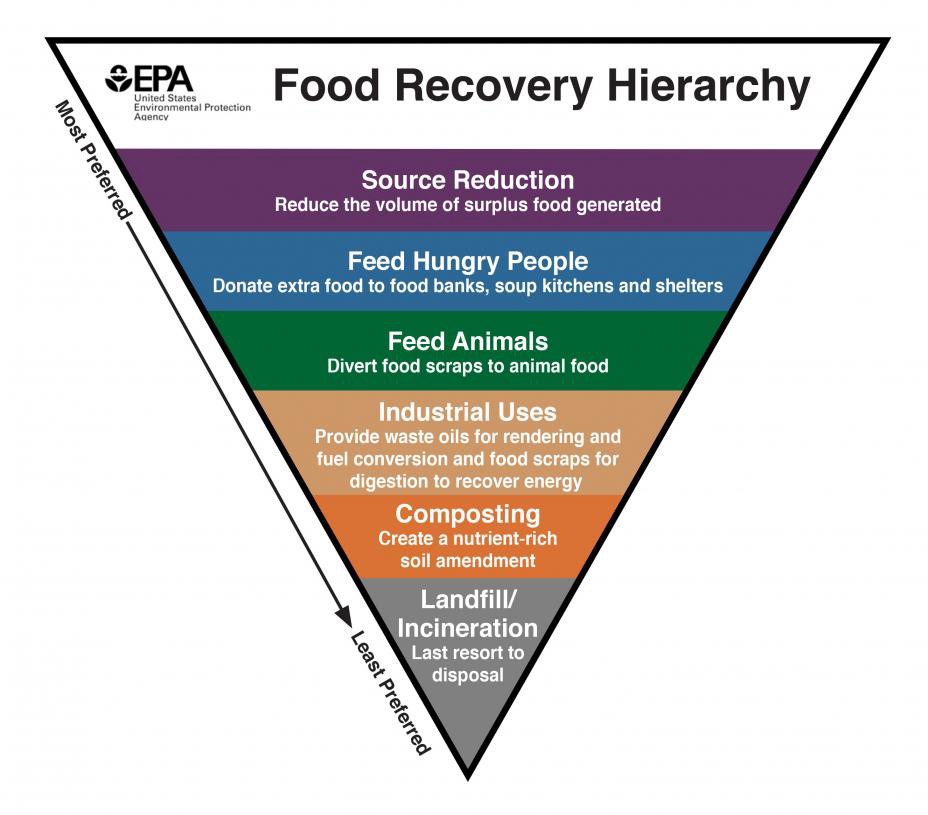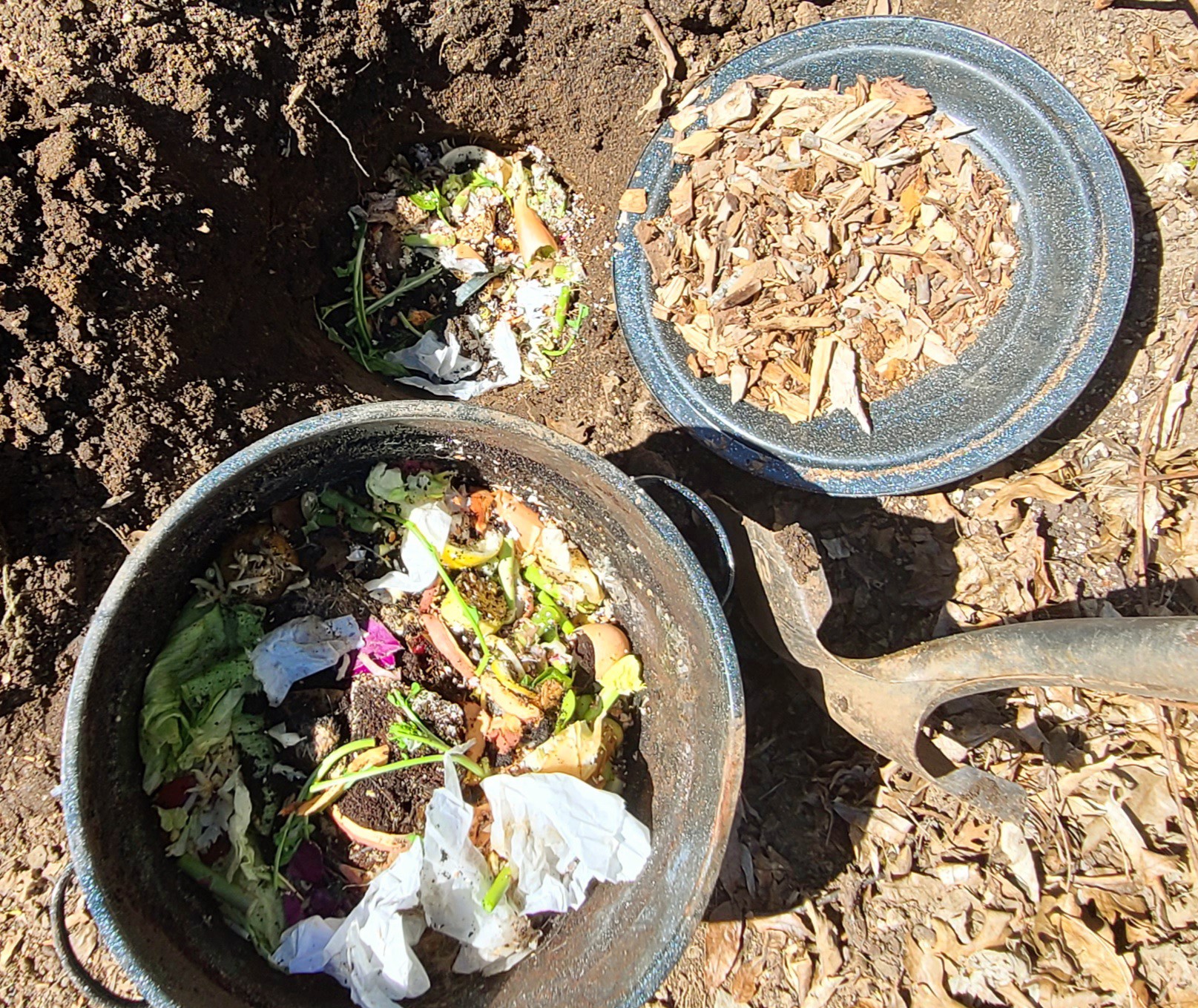Cold and mushy Brussels sprouts—previously frozen, then heated, then cold again—were the worst, but they weren’t the only bits of food I pushed around my plate in my youth that I had to finally gag down before I could leave the table.
“Don’t you realize there are starving kids in Africa?” my parents would chastise.
My unrepentant thinking at the time went something along the lines of Then why don’t we pack it up and send it to them? I would gladly share this food with starving people.
Here in the United States, it is estimated that we waste approximately 40% of all food produced for human consumption.
It is estimated that we waste approximately 50% more food than we did when I was contemplating my plate as a youth in the ’60s and ’70s. Shockingly, it is estimated that 1/3 of all the food produced on the planet never makes it into a mouth. Much of this loss in developing countries happens due to harvest, processing, and storage issues. In higher-income countries, much of the loss occurs at the consumer level.
Here in the United States, it is estimated that we waste approximately 40% of all food produced for human consumption. As a country, we comprise only 4% of the world’s population, but we rank near the top in food waste. Not unrelated, and always important to emphasize, we also are responsible for 15% of the world’s greenhouse gas emissions, second only to China.
Food waste occurs in all sectors, from farm to table. Naively, I had assumed there must be more waste and food loss in the farming, processing, retail, and institutional sectors than in our homes. However, though calculations and methodologies vary by organization, all data agree that my assumptions were categorically wrong. The Natural Resources Defense Council’s detailed 2017 report, Wasted: How America Is Losing Up to 40 Percent of It’s Food From Farm to Fork to Landfill, estimates that households are responsible for 43% of wasted food in the U.S., the most significant piece of the pie. A staggering and sobering statistic.
Yet, the mountains of data showing the profound negative impact of food waste combined with the fact that we consumers in our homes create the largest portion of it could also be seen as hopeful.
Hopeful!? Why?
Because we don’t have to wait for anyone else to argue and legislate. We can immediately begin (those of us who haven’t already become Zero-Waste Masters) to address food waste, right now, today, in our own homes. And doing so will have an enormous impact.
What We Are Wasting, in Addition to the Food
Our refrigerators, which typically hold perishables, are most often ground zero of food waste in our homes. There are the greens turning to gelatinous goo in the bottom of the crisper, the leftover vegetarian chili we are tired of and don’t have room for in the freezer (and besides, pizza sounds good tonight), the dried out tortillas, the celery that is turning brown, the excess apples turning to mush, and so on.
“Guess it’s time to clean the fridge out,” I mutter resignedly to myself when there’s no room for leftovers or new groceries, or when I can’t see or reach what might still be good at the back, or when the green goo starts leaking out the door, or after the hubby has to duct tape the bulging door closed before he leaves for work so it will stay shut.
For better or worse, I’ve been in charge of the fridge for some 38 years now. And I’ve always felt bad about the food I’ve tossed and for the hard-earned money that had gone to pay for it. But my thinking never really went much farther than that. Until it did.
I thought I was mindful of my ecological footprint, but when I finally examined my foodprint and the enormous negative impact my poor planning and waste were having on the environment and planet I thought I was trying to save? I was appalled and embarrassed.
To better understand the enormity of what I had been wasting—besides food, hard-earned money, and all my other personal resources used to obtain, store, and cook the food (if I got that far)—I made a list. And while it is not exhaustive, I find it beyond compelling. And, notably, when the food produced is meat, especially beef, all of the wasted resources increase significantly.
When I waste food, I’m also wasting:
- The land the food was grown or raised on
- The precious freshwater used to irrigate the land and hydrate livestock
- The fuel required for farming
- The many resources used to produce, harvest, package, and transport seeds, animal feed, fertilizers, soil amendments, and all of the other resources required for farming
- The many resources that went into dealing with weeds, pests, and fungus (in the U.S., we annually drop 1.1 billion pounds of pesticides on crops, 23% of the global total)
- All of the resources used to plant, harvest, or procure the food
- All of the resources that went into processing the food
- All of the resources that went into packaging the food, sometimes multiple times
- All of the waste that packaging creates
- All of the resources required to transport the food, often multiple times
- All of the resources necessary to store the food, often at multiple facilities
- The labor needed at every level, and the resources used by that labor in the course of their work
Then, there is the incredibly colossal amount of greenhouse gases and polluted air and water generated at every step between farm and fork. It’s one thing, and another story, when these gases and pollution occur due to producing food that nourishes, but when the food ends up wasted? Because of me? It’s calamitous.
And it just keeps getting worse. Unless we compost at home, there are all of the costs, environmental and otherwise, associated with having our food waste transported away from our homes—including what we pay to have it hauled, the fossil fuel required for the transport, and the pollution and greenhouse gasses created by the transportation.
This then brings us to the landfill, where the food waste problem is exponentially exacerbated. The EPA estimates that 66% of the wasted food we in the residential sector dump into the municipal solid waste stream is landfilled. Our food waste that is now trapped (sealed, without oxygen) inside landfills begins producing methane, a gas 84 times more potent than carbon dioxide within the first 20 years of its release and 28 times stronger than CO2 over the course of 100 years. In just the United States alone, the greenhouse gasses produced by our wasted food rotting in landfills are estimated to equal the emissions of 37 million cars.
On the global scale, according to the United Nations Environment Programme, if food waste were a country, it would only trail China and the U.S in greenhouse gas emissions.
And What About Hunger and Food Insecurity?
Globally, nearly 800 million people experienced severe food insecurity in 2019, and another 1.25 billion experienced moderate food insecurity. Sadly, with the COVID-19 pandemic, it is expected these numbers have risen. An alarming new United Nations report warns: “Over 34 million people are grappling with emergency levels of acute hunger, meaning they are one step away from starvation.”
In the United States, 35.2 million individuals experienced food insecurity in 2019. The numbers here, due to the pandemic, have also worsened.
Of course, there are numerous contributing factors to hunger and food insecurity, including political conflict, climate crises, economic downturns, and pandemics. However, contrary to the common perception that world hunger exists because there isn’t enough food, it’s important to note that we already produce enough food to feed everyone, including the estimated two billion hungry and food-insecure.
To emphasize, nearly one-quarter of the world’s population do not have routine access to healthy food even though we produce enough to feed them.
In 2015, the United Nations established 17 crucial sustainable development goals (SDG) in their 2030 Agenda For Sustainable Development. By tackling food waste, we can quickly begin to address SDG #2, which aims to achieve zero hunger; SDG # 12.3, which targets halving food waste at the retail and consumer levels; and SDG #13, which implores us to take urgent action to combat climate change.
In September of the same year, the USDA and EPA also set the year 2030 for halving food waste in the U.S., and the FDA is working in conjunction with them to educate the public.
While these are valuable and essential goals, I have to agree with climate activist Greta Thunberg when she said in an interview recently with the Financial Times, “We need to stop focusing on dates and numbers and actually accept and acknowledge the fact that we need to reduce our emissions right now. We can talk about 2030 or 2040 as much as we want. But it is what we are doing now that really matters.”
Tackling food waste in our own homes is one simple thing that we can do now that really matters. These efforts will not only free up resources that can go a long way toward helping feed the world’s hungry and food-insecure, they will also help reduce greenhouse gas emissions on the planet.
What We Can Do In Our Kitchens, Communities, and Backyards
The USDA and EPA have collaborated on establishing a helpful six-component food waste recovery hierarchy, with the most preferred option at the top and least preferred at the bottom. Three of them are especially helpful for us at the residential level.
Source Reduction is step one, stopping food waste before it happens. It is the number one thing we can do to help abate food waste. Simple practices include:
- Eating what we have. We simply look inside our fridge and pantry and see what most needs to be eaten and plan a meal based on that. If unsure what to make, we can check the index of a favorite cookbook or do an internet search with the terms. For example, I have those squash from last summer, the sweet potato, and also some greens that all need to be eaten. Pasta sounds good tonight so I did an internet search—”squash, sweet potato, greens, pasta”—and I found a recipe that I’ll use as my inspiration.
- Better planning. The same thing above applies to menu planning and shopping. We look in our refrigerator and pantry first and then plan menus and shopping based on what needs to be eaten. Also necessary is making a list and doing our best to stick to it. And resisting buying more than we need, especially produce, even if it’s those avocados that are on sale.
- Shopping for just a few main meals at a time—especially when it comes to buying perishables. Too often, there are more leftovers than expected, or our neighbors invite us to that impromptu potluck, or we impulsively grab takeout on our way home. Planning for fewer meals helps avoid over-shopping and ending up with highly perishable items we can’t get to. Alternatively, keeping carrots, celery, onions, and potatoes on hand—vegetables that keep longer than many other items—allows for quickly transforming some basics into a wide variety of dishes when the menu plan runs dry before the next shopping date.
- Being resourceful. If we have most items needed for that pizza but don’t have any sauce, we can use pasta sauce. Or grind up whatever greens we may have on hand with some garlic, nuts, and olive oil for some quick pesto magic. If we don’t have a recipe ingredient, we can ask if it’s essential, and if so, check online for a substitute. For example, if you’re missing an egg for that birthday cake, you can substitute two tablespoons of mayonnaise.
- Making friends with the freezer. Yes, the freezer is a great place for the chili that we tire of by the third night, but it’s also a great place to keep other things. For example, we can keep a container for stale or excess bread (including the heels) for when we need to make croutons, breadcrumbs, soups, or one of my favorite “clean out the fridge” kind of recipes—vegetable strata. Bread is only one thing, but speaking of it reminds me of one enterprising food waste warrior who is turning stale and excess bread into beer!
- Labeling the food. We all think we’ll remember, right? But if it’s not marked, there’s a good chance that it’ll get tossed (even though it might still be good) when we can’t recall what it is or when we made it. I now mark containers with wine glass markers before putting them into the fridge or freezer. It’s also a good idea to keep a memo pad attached to the fridge, making a note of what went in and when.
- Trusting our senses. Studies find that a good portion of the food we toss is thrown out too soon because we misunderstand dates. Until I set out to educate myself about food waste, I had the misconception that food might make me or my family sick if it was outdated. But then I learned that, aside from infant formula, the dates marked on the foods we buy—”best if used by,” “sell by,” “best before,” “enjoy by,” and expiration dates—are not only confusing but not yet federally regulated. Currently, these recommendations are merely suggestions about when a product is at its freshest. I also learned that eating food that is a little past its prime doesn’t typically make us sick. Food-borne illness comes from pathogens and contamination, not from the natural decaying process. By learning to trust our sense of sight, smell, touch, and taste, we can avoid tossing food that is still safe to eat. Save the Food is one place to start when looking for food-saving tips and recipes for using foods that are past their prime. I just left this writing briefly to whip up a delicious chocolate mousse using overripe avocados (from that sale I warned against) that were on my counter.
- Embracing ugly produce. Tons of perfectly good produce goes uneaten every year in the U.S. simply because of unrealistic retail and consumer expectations regarding appearance. Many non-profit organizations and for-profit entrepreneurs are now working to save this food from rotting in the fields or getting sent to the landfill. Households can also help by requesting that their local grocer stock imperfect produce, and then they can support this request with their dollars. I have been guilty of sorting through produce to find perfect specimens, but after learning how much waste this creates and knowing that appearance does not affect taste or nutritional value, I am much more conscious about showing more love to the ugly produce. (Marketing research has shown that using the term “ugly” helps imperfect produce receive a little more positive attention!)
When we master all of these things and learn to work with and eat what we have, we’ll not only save a lot of money and trips to the grocery store, we’ll also be helping to save the planet and the resources necessary to help feed the hungry.
Feeding the Hungry is step two on the hierarchy and involves the recovery of good food from all sectors and sharing it with food-insecure populations. Exactly what I wanted to do when I was a kid! Not that I would be able to take my actual plate to a nearby food pantry now, but numerous organizations, including K-12 schools and universities, are doing extraordinary work to help recover good food from all sectors—farms, production facilities, institutions, restaurants, retail stores, dumpsters, and our homes—to those who need it, rather than it being sent to the landfill.
Also, food-sharing apps are helping recover food from all sectors, including households with excess food in their kitchens and gardens. These apps currently appear to be most popular and successful across the pond, but technologies that help us share excess food are promising. If you want to share your excess, and organizations and apps aren’t currently functional in your community, you can check with your local food pantries and shelters to see if they will take your excess perishables and garden produce.
Composting is step five, recognizing that food scraps and food waste are invaluable resources in the food cycle. Composting can be done in a variety of ways at one’s residence, through municipal programs offered in some communities, or through hiring a private food scrap hauler who will come by regularly for a very reasonable fee and collect scraps and get them to a nearby farm or facility that can process them into feed or compost.
I’ve only recently begun educating myself more fully on the stupendous ramifications of wasting food, but I have been composting for a while and am passionate about the “dig and drop” method, which is a variation of trench composting, also known as the “Lazy Man’s Method.” (My parents always did accuse me of being lazy.) Every day, I drop my kitchen scraps into a large enamelware canning pot (though anything with a lid will work) that sits outside my back door, and then once every week or two, I simply dig a hole and drop the contents of the pot into the hole, layering in “browns” (leaves, sawdust, paper, tissues, egg cartons, torn up cardboard) as I go. I next back-fill with six to eight inches of dirt and then tamp lightly, leaving the shovel where I left off to mark it for the next dig.
When the garden is bare in the winter, I crisscross back and forth across the garden space. In the summer, I dig in the rows between plants. I’m amazed at how quickly the scraps degrade, all with minimal effort from me. Worms have become plentiful, the clay and granite subsoil is improving dramatically, plantings (present or future) benefit from the organic nutrition, and I’m not sending any food to the landfill! There are no smells with this method, no turning a pile or bin, no critter problems, and nothing has yet to bother my pot that I collect the compost in (even when I used to keep it on the front porch, 20 feet from our neighborhood bears, when I paid to have it picked up).
The last “option” in the Food Waste Recovery Hierarchy is the landfill—an option of last resort that signifies we have failed the first five preferred options (which also include feeding animals, and turning wasted food into biofuel and bioproducts).
In the U.S., six states and several municipalities have already passed laws to keep food out of landfills. Eventually—much like widespread recycling of metals, paper, cardboard, and glass—this will likely become the norm rather than the exception.
Vermont’s statewide food scrap ban went into effect just last year. Their program stands out as an excellent model regarding outreach, education, and support, with an easy to navigate website chock-full of information for helping residents comply with the new law. Local governments must provide food scrap collection to businesses, institutions, and apartments with four or more units. Beyond that, residents may ask their local solid waste hauler if they collect food scraps, or they can take them for free to a local drop-off facility, or they can pay a private food scrap hauler to pick them up. Private food scrap hauling has grown from only 20 haulers statewide when the law went into effect to more than 50 now.
Vermont’s new law has been a score for farmers, the planet, and the hungry. Food scraps kept out of the landfill end up at area farms and are either used for animal feed or they are composted to help in the generation of new food, greenhouse gasses are being minimized, and food donation (feeding hungry people) in the state has nearly tripled since the law was passed.
Shift Happens
Merriam-Webster defines a paradigm shift as “an important change that happens when the usual way of thinking about or doing something is replaced by a new and different way.” In a relatively short period of time, we have witnessed many paradigm shifts—from the simple and trivial to the complex and momentous. From how we use apps to book travel, for example, to the now widespread support of same-sex marriage.
Another shift is also underway with our relationship to food, food waste, food justice, and understanding how each impacts world hunger and climate change.
Seemingly small actions have enormous consequences. There are 129 million households here in the United States, and most of us are responsible for the largest chunk of wasted food in a country that wastes, per capita, more than almost every other country in the world. Because of this, we also embody enormous potential. Together, we can create the shift needed for humanity’s food security, a healthier planet, and the future of both.
It turns out my parents were on to something after all. Let’s eat our food.
This post was originally published on Radio Free.





